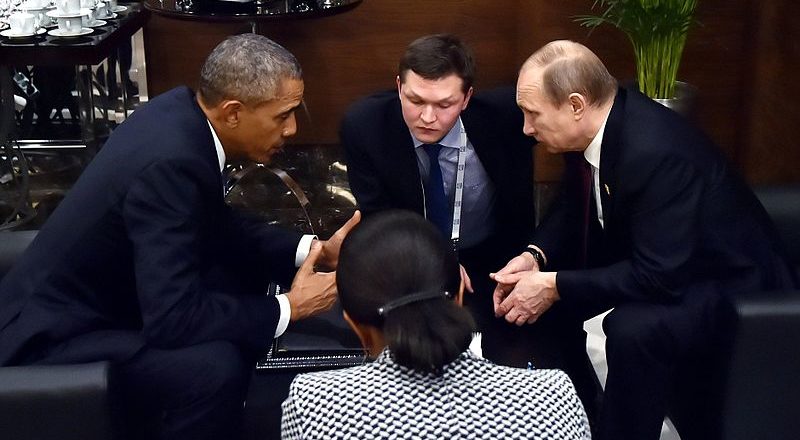A nation must think before it acts.
 President Barack Obama (L) meets with Russian President Vladimir Putin on the sidelines of the G20 Summit in November 2015 (Source: kremlin.ru)
President Barack Obama (L) meets with Russian President Vladimir Putin on the sidelines of the G20 Summit in November 2015 (Source: kremlin.ru)
The Obama administration’s current Russia policy needs a stronger dose of realpolitik. In particular Washington and its G-7 partners should re-evaluate the impact of economic sanctions, imposed on Russia in the wake of its 2014 invasion of Ukraine. Plainly, the sanctions aren’t working, in the sense of dialing back Moscow’s reprehensible behavior, and moving the crisis toward solution. Russia continues to support the Ukrainian rebels and the Crimea has been fully incorporated as the country’s latest federal administrative district—apparently a done deal.
Moreover, restricting Russia’s access to western capital has repercussions, well beyond Ukraine. In fact, it is reshaping global power relations, pushing Russia into a quasi-alliance with China that threatens American interests far more directly than Russia’s transgressions in far eastern Europe. This is especially apparent in Asia, where the deepening Sino-Russian partnership adds to China’s geopolitical weight, spooking its neighbors and potentially challenging the US-led security order in the region. Sanctions always impose costs on the sanctioners but in this case the costs seem exorbitantly high.
To be sure, the Sino-Russian entente isn’t entirely the fault of western sanctions. Russia and China have long shared a hostility to US “hegemony” in world affairs, and Russia had for some time been reorienting its foreign relations from Europe to the more dynamic markets of the east, Yet the sanctions policy greatly accelerated, concentrated and magnified the shift. Perhaps the most visible consequence is that Russia is now heavily dependent on China for development of its resource-rich and strategically pivotal eastern territories. (Russia’s east is the site of a host of new cooperative projects energy, mining, finance, high-tech, transport and other fields.) As China consolidates its influence in Russia’s eastern domains, Russia is increasingly likely to follow Beijing’s lead in Asian economic and security affairs—worrying US allies and raising questions about the long-term sustainability of US commitments in the region.
Washington now needs to think through the consequences of the sanctions policy and consider making adjustments. The process should not have to await final resolution (whatever that means) of the Ukraine mess. The place to start is Asia. A first step could be to allow Japan, an important potential counterweight to China, to normalize economic relations with Russia. Also, non-G-7 Asian states should no longer be pressured by Washington to curtail Russia ties.[1] The idea is to encourage a greater diversity of regional partners for Russia in managing the development of its Asian domains. Asian states have a strategic as well as an economic stake in establishing a strong foothold in these vulnerable territories, now increasingly under China’s sway. America, of course, shares a strategic interest in balancing China, a reason why the G-7 sanctions regime should not remain in place much longer.
China aside, America should continue to seek a modus vivendi with Russia over Ukraine and other issues of post-Soviet space; yet the crisis seems likely to simmer for some time, especially given Russia’s seemingly irrevocable annexation of Crimea. In the meantime, a more promising route to repairing and revitalizing relations may lie through Asia rather than Europe. Generally speaking, the sides have few outstanding differences in the Asia-Pacific and — as neighbors across the Bering Strait — they share an objective responsibility for regional security and stability. To this end, Russia and America would do well to reach a meeting of the minds on China, which threatens the Asian security interests of both, albeit in different ways. Russia should recognize that its desperate courtship of Beijing will diminish its independent influence and credibility as an Asian state, and — worse — cost it a measure of real sovereignty over its valuable eastern territories. America, for its part, should discard its remaining illusions about China’s “peaceful rise” and directly acknowledge Beijing’s threat to replace the United States as” security guarantor” for East Asia.[2] Eventually, Moscow and Washington will need each other’s help to manage China’s rise successfully and contain its regional ambitions. How or whether such cooperation can develop remains to be seen.
[1] See Rensselaer Lee and Artyom Lukin, Russia’s Far East: New Dynamics in Asia-Pacific and Beyond (Boulder, CO: Lynne Rienner, 2015), pp. 243-245. A recent report by the International Institute of Strategic Studies edges toward a similar recommendation regarding Japan, though conditionally: “the US should not discourage Japan from pursuing normalization of relations with Russia, if Tokyo believes that could serve its strategic interests without compromising its commitments made in the context of the G-7.” IISS, “The US and Russia in the Asia-Pacific,” Washington, DC, March 2016, p. 17.
[2] IISS, “The US and Russia,” p. 5.




